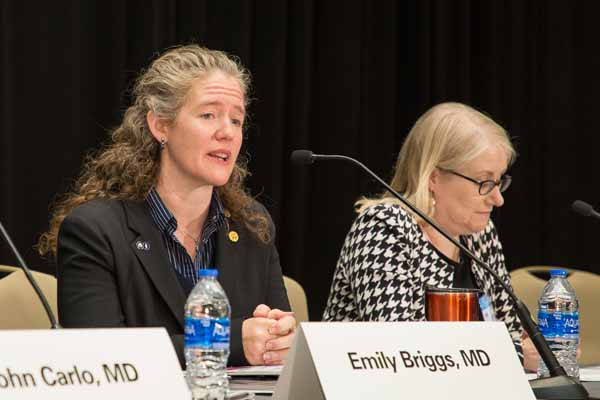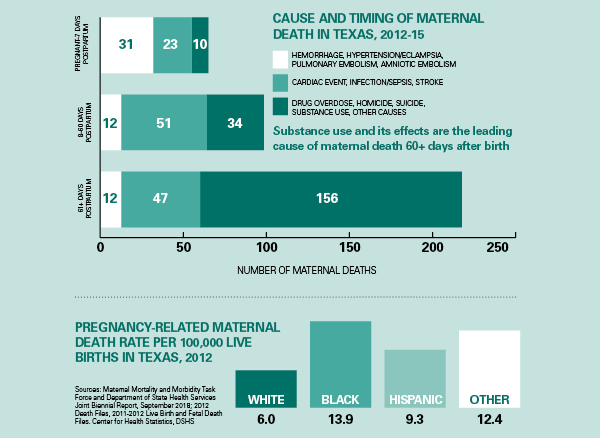
The Texas Medical Association will call on Texas lawmakers to support initiatives designed to improve maternal and children's health during this year's legislative session, according to the chairs of two TMA committees who spoke at Winter Conference in Austin on Saturday.
One of TMA's top initiatives is improving maternal services for low-income women, particularly ensuring access to care through the first year after delivery, says Emily Briggs, MD, chair of the Committee on Reproductive, Women's, and Perinatal Health.
 Currently, 54 percent of deliveries in Texas are covered by Medicaid, which expires for new mothers 60 days after birth. However, the overwhelming number of maternal deaths occur among low-income women after day 61, Dr. Briggs says.
Currently, 54 percent of deliveries in Texas are covered by Medicaid, which expires for new mothers 60 days after birth. However, the overwhelming number of maternal deaths occur among low-income women after day 61, Dr. Briggs says.
From 2012 to 2015, 64 Texas women died within seven days of birth, 87 died within eight to 60 days of birth, and 215 died after 60 days, according to the Department of State Health Services (DSHS).
"At some point, concerningly, in that 61-plus days they might have gone off Medicaid and not had any coverage," said Dr. Briggs, a New Braunfels family medicine specialist. "In that [year] post-partum, we need coverage. We need to support our women, our mothers."
In the first 60 days, the main causes of death among new mothers are clinical, such as hemorrhage, hypertension, embolism, infection, and stroke, according to the DSHS. "[But] if you look at the [main causes of death after 60 days], most of these are preventable," such as drug overdose, homicide, suicide, and substance use, Dr. Briggs said.
Reversing the rise in nonmedical vaccine exemptions is another TMA legislative initiative to protect maternal and children’s health.
Texas has become a hot spot for infectious disease outbreaks, many of which are vaccine-preventable such as influenza and pertussis (whooping cough), says C. Mary Healy, MD, chair of TMA’s Committee on Infectious Diseases.
The state has not had a problem with rubella, says Dr. Healy, an associate professor of pediatrics in the Infectious Disease Section at Baylor College of Medicine in Houston. But the rubella vaccine is part of a combined measles-mumps-rubella (MMR) vaccine, and many people who oppose vaccines specifically refuse to get the measles vaccine.
"If you look at the data on the measles vaccine, and you look at our rates of vaccine refusers, if people are not getting measles vaccines, what other vaccines are they not getting?" Dr. Healy said. "They're not getting their rubella. So it's likely only a matter of time before you have that undervaccinated population getting a case of rubella."
Republican voters overwhelmingly support strong vaccination measures, according to a 2018 poll, so physicians should encourage Republican lawmakers — who hold a majority in both houses of the Legislature and all statewide offices — to do likewise, Dr. Healy says.
"TMA this legislative session is preparing to oppose efforts to weaken school vaccination requirements, to support measures to improve vaccination rates and lower the risks for outbreaks, and to support better government transparency in listing school data that [shows] our vulnerability to outbreaks," she said.
TMA also is supporting the Department of State Health Services in its calls to address funding shortfalls in several vital areas, Dr. Healy says.
Other TMA initiatives to improve maternal and child health in this session include:
Promoting Texas AIM, a program that helps hospitals and clinics in Texas carry out maternal safety projects. Currently, 207 are enrolled;Streamlining and automating the transition from Medicaid to Healthy Texas Women for adolescents aging out of Medicaid and CHIP;
- Ensuring that women getting treatment for substance-use disorder in treatment programs can obtain maternal care;
- Promoting public education on the importance of prenatal care;
- Eliminating Medicaid eligibility barriers to allow timely enrollment;
- Supporting efforts to reduce risk factors associated with maternal illness and death, such as initiatives to reduce smoking before and during pregnancy;
- Eliminating barriers to obtaining long-acting reversible contraceptives; and
- Improving state surveillance of maternal mortality, and ensuring death records are accurate.
For more details on the association’s advocacy agenda in maternal and public health, see TMA’s Healthy Vision 2025, sections 5 and 7.